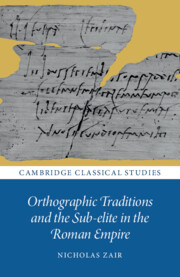The reduplicated perfect of spondeō ‘I swear’ was originally spepondī, a spelling still used by Valerius Antias, Cicero and Caesar in the first century BC, according to the second century AD author Aulus Gellius (Noctes Atticae 6.9.12–15), implying that spopondi was the standard spelling at the time. The inscriptional evidence outside the corpora is not very numerous; to some extent it supports this interpretation. There are only 4 instances of spepondi (AE 1987.198, AD 256; AE 1987.199, AD 254–256, both from Ostia; CIL 6.10241, around the age of Hadrian; CIL 6.18937). By comparison, there are 8 of spopondi, of which 2 are dated to the first century AD: CIL 2.5042 = 5406 (AE 2000.66), CIL 6.10239 (EDR177718).Footnote 1
It is reasonable to deduce that spopondi is the standard spelling in the tablets of the Sulpicii and the Herculaneum tablets; it appears frequently in those parts written by both scribes and others (TPSulp. 1, 1bis, 2, 6, 7, 8, 12, 22, 27, 42, 44, 48 (4 times), 51, 53, 54, 57, 63, 68, 69, 75, 103, 104, 105; TH2 6, 60, 59 + D01, 61, A6, A7, D12, 4, 3). It also appears once in the Caecilius Jucundus tablets (CIL 4.3340.154), and once at Vindonissa (T. Vindon. 3, AD 90).
In the tablets of the Sulpicii there are also instances of spepondi in the chirographa of C. Novius Eunus (TPSulp. 51, 52, 67, 68, AD 37–39), who actually writes spepodi, L. Faenius Eumenes (27, AD 48), and L. Marius Jucundus, freedman of Dida (53, AD 40). It is noteworthy that the old-fashioned spelling appears only in the writing of non-scribes, and that all three writers have at least one substandard spelling. In addition, both Novius Eunus and Faenius Eumenes also include other old-fashioned features. For the spelling of these writers, see p. 262.Footnote 2

